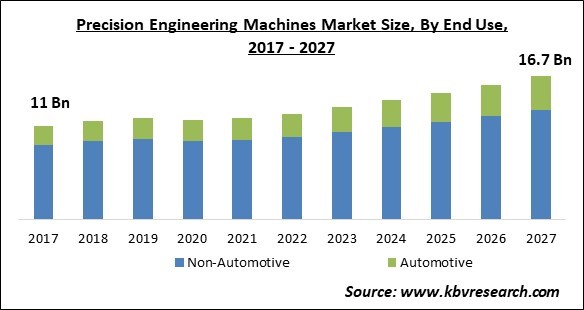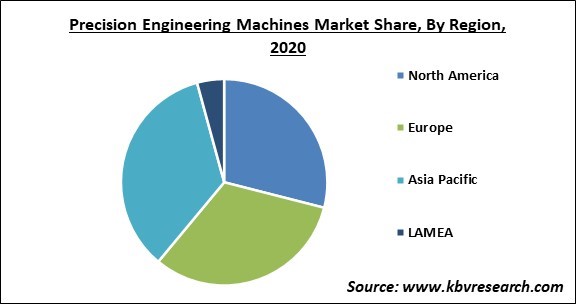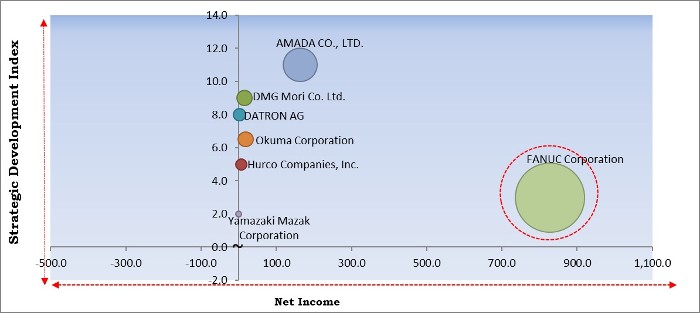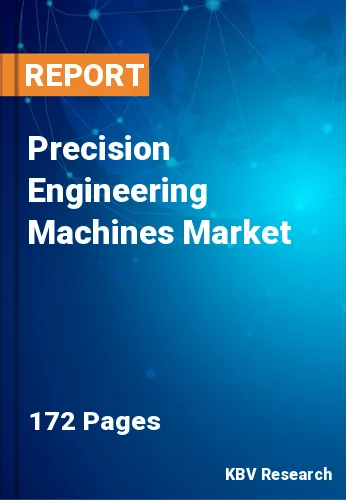The Global Precision Engineering Machines Market size is expected to reach $16.7 billion by 2027, rising at a market growth of 6.0% CAGR during the forecast period.
Precision engineering machines are the instruments that are used to offer clear and accurate production outputs to the manufacturing facility. These instruments eliminate the requirement of human power during any production process. Precision engineering machines are designed and developed with a technique that enables them to maintain, measure, and follow the procedure assigned by the operator to the machine, in order to provide the same output as demanded by the user.
Machining solutions provide computerized accuracy, which helps to eliminate the efforts on repetitive tasks and machining time, hence driving up the production process efficiency. In addition, technological improvements have led to the creation of software that allows managers to track real-time machining activities on the shop floor and make well-informed decisions.

The outbreak of the COVID-19 pandemic has had a devastating impact on the global economy. All the primary, secondary, and tertiary sectors were majorly demolished. The COVID-19 pandemic also majorly affected the precision engineering machine market. Due to the diffusion of the COVID-19, the governments of all the countries over the world were forced to impose a complete lockdown which led the world to a complete industrial closure.
The precision engineering machine market faced a major downfall due to the closure of factories across the world. The closure of manufacturing facilities of the precision engineering machines has significant disrupted the supply chain of the product.
Various distinct and new technologies are being introduced rapidly in the era of modernization. Among this vast and advanced range of technology, programmed automation is one of the most popular and widely-used technology. Programmed automation has redefined the concept of machine automation with its function of executing a series of instructions inserted by the human in the systems. Precision engineering machines are comprised of programmable automation which facilitates the manufacturer to produce various clones of the same product without any manpower.
Conventional production methods consume a significant amount of time due to the fact that it is performed by humans and is comparatively slower than the automated production process. Precision engineering machine allows the manufacturer to increase the number of units that are being produced in a particular period of time as well as it accelerates the speed of the production of the goods. Precision engineering machines integrate automation which enables the manufacturer to leverage the instrument by manufacturing a significant number of products units in lesser turnaround time with increased and enhanced accuracy in comparison to the traditional production process.
Precision engineering machines save a huge amount during the production procedures. However, precision engineering machines come with a high installation cost which is not easily affordable by all the manufacturers. The cost that occurs during the deployment of precision engineering machines in factories or other manufacturing units is significantly higher if compared to conventional production setups. Moreover, few of the precision engineering machines comprise a significant infrastructure. Further, these huge infrastructures require a lot of space to be implanted. Due to this factor, the manufacturer has to increase the investment in buying commercial spaces which would also lead to higher taxes for commercial property. Moreover, there are many mid-size manufacturers that cannot afford to purchase these high-end components.

Based on End User, the market is segmented into Non-Automotive (Engineering & Capital Goods, Power & Energy, Aerospace & Defense, and Others) and Automotive. The automotive segment is anticipated to register the rapid growth rate in the precision engineering market in the forecasting years due to the continuously increasing demand for autonomous vehicles along with various factors such as advancement in robotics, and innovative mobility solutions, etc.
| Report Attribute | Details |
|---|---|
| Market size value in 2020 | USD 11.6 Billion |
| Market size forecast in 2027 | USD 16.7 Billion |
| Base Year | 2020 |
| Historical Period | 2017 to 2019 |
| Forecast Period | 2021 to 2027 |
| Revenue Growth Rate | CAGR of 6% from 2021 to 2027 |
| Number of Pages | 172 |
| Number of Tables | 264 |
| Report coverage | Market Trends, Revenue Estimation and Forecast, Segmentation Analysis, Regional and Country Breakdown, Competitive Landscape, Companies Strategic Developments, Company Profiling |
| Segments covered | End Use, Region |
| Country scope | US, Canada, Mexico, Germany, UK, France, Russia, Spain, Italy, China, Japan, India, South Korea, Singapore, Malaysia, Brazil, Argentina, UAE, Saudi Arabia, South Africa, Nigeria |
| Growth Drivers |
|
| Restraints |
|
Based on Regions, the market is segmented into North America, Europe, Asia Pacific, and Latin America, Middle East & Africa. In 2020, APAC held the largest revenue share of the precision engineering machines market which is attributed to the increasing number of technological advancements and adoption going across the different countries of the region. APAC is a region with various developing countries which is a major reason for the rising demand for precision engineering machines intending to fulfill the demand of the customers for perfectly designed and developed products.

Free Valuable Insights: Global Precision Engineering Machines Market size to reach USD 16.7 Billion by 2027
The major strategies followed by the market participants are Product Launches. Based on the Analysis presented in the Cardinal matrix; Fanuc Corporation is the major forerunner in the Precision Engineering Machines Market. Companies such as Yamazaki Mazak Corporation, Hurco Companies, Inc., and AMADA Co., Ltd. are some of the key innovators in the Market.
The market research report covers the analysis of key stake holders of the market. Key companies profiled in the report include Amera-Seiki Corporation, DATRON AG, Haas Automation, Inc., Hurco Companies, Inc., AMADA CO., LTD., Okuma Corporation, Yamazaki Mazak Corporation, Dalian Machine Tool Group (DMTG) Corporation, DMG Mori Co. Ltd., and FANUC Corporation.
By End User
By Geography
The precision engineering machines market size is projected to reach USD 16.7 billion by 2027.
Reduces the downtime of the production are driving the market in coming years, however, the expensive infrastructure of fixtures limited the growth of the market.
Amera-Seiki Corporation, DATRON AG, Haas Automation, Inc., Hurco Companies, Inc., AMADA CO., LTD., Okuma Corporation, Yamazaki Mazak Corporation, Dalian Machine Tool Group (DMTG) Corporation, DMG Mori Co. Ltd., and FANUC Corporation.
The Non-Automotive market dominated the Global Precision Engineering Machines Market by End Use 2020, and would continue to be a dominant market till 2027.
The Asia Pacific market dominated the Global Automotive Precision Engineering Machines Market by Region 2020, and would continue to be a dominant market till 2027.
Our team of dedicated experts can provide you with attractive expansion opportunities for your business.

